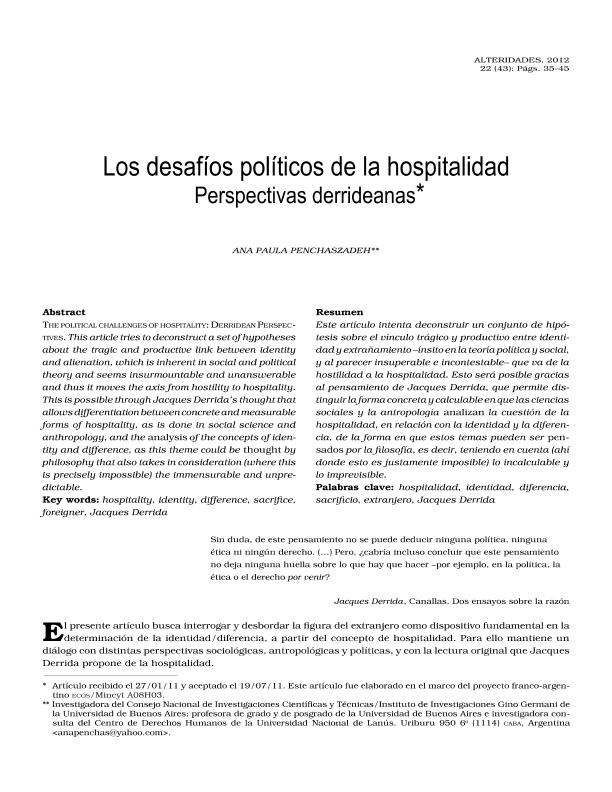Artículo
Este artículo intenta deconstruir un conjunto de hipótesis sobre el vínculo trágico y productivo entre identidad y extrañamiento ínsito en la teoría política y social, y al parecer insuperable e incontestable, que va de la hostilidad a la hospitalidad. Esto será posible gracias al pensamiento de Jacques Derrida, que permite distinguir la forma concreta y calculable en que las ciencias sociales y la antropología analizan la cuestión de la hospitalidad, en relación con la identidad y la diferencia, de la forma en que estos temas pueden ser pensados por la filosofía, es decir, teniendo en cuenta (ahí donde esto es justamente imposible) lo incalculable y lo imprevisible. This article tries to deconstruct a set of hypotheses about the tragic and productive link between identity and alienation, which is inherent in social and political theory and seems insurmountable and unanswerable and thus it moves the axis from hostility to hospitality. This is possible through Jacques Derrida’s thought that allows differentiation between concrete and measurable forms of hospitality, as is done in social science and anthropology, and the analysis of the concepts of identity and difference, as this theme could be thought by philosophy that also takes in consideration (where this is precisely impossible) the immensurable and unpredictable.
Los desafíos políticos de la hospitalidad: perspectivas derridianas
Título:
The political challenges of hospitality: derridean perspectives
Fecha de publicación:
09/2012
Editorial:
Universidad Autónoma Metropolitana-Iztapalapa
Revista:
Alteridades
ISSN:
1413-3938
Idioma:
Español
Tipo de recurso:
Artículo publicado
Clasificación temática:
Resumen
Palabras clave:
HOSPITALIDAD
,
IDENTIDAD
,
DIFERENCIA
,
DERRIDA
Archivos asociados
Licencia
Identificadores
Colecciones
Articulos(SEDE CENTRAL)
Articulos de SEDE CENTRAL
Articulos de SEDE CENTRAL
Citación
Penchaszadeh, Ana Paula; Los desafíos políticos de la hospitalidad: perspectivas derridianas; Universidad Autónoma Metropolitana-Iztapalapa; Alteridades; 43; 9-2012; 35-45
Compartir




